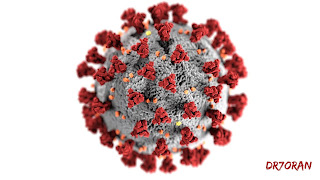Coronavirus
February 18, 2020
COVID-19
illness ranging from the common cold to more severe diseases such as Middle East Respiratory Syndrome (MERS-CoV) and Severe Acute Respiratory Syndrome (SARS-CoV). A novel coronavirus (
has not been previously identified in humans.
animals and people. Detailed investigations found that SARS-CoV was
transmitted from civet cats to humans and MERS-CoV from dromedary camels to
humans. Several known
yet infected humans.
Common signs of infection include respiratory symptoms, fever,
cough, shortness of breath and breathing difficulties. In more severe cases,
infection can cause pneumonia, severe acute respiratory syndrome, kidney
failure, and even death.
cough, shortness of breath and breathing difficulties. In more severe cases,
infection can cause pneumonia, severe acute respiratory syndrome, kidney
failure, and even death.
Standard recommendations to prevent infection spread include
regular hand washing, covering mouth and nose when coughing and sneezing,
thoroughly cooking meat and eggs. Avoid close contact with anyone showing
symptoms of respiratory illness such as coughing and sneezing.
regular hand washing, covering mouth and nose when coughing and sneezing,
thoroughly cooking meat and eggs. Avoid close contact with anyone showing
symptoms of respiratory illness such as coughing and sneezing.
A coronavirus
a kind of common virus that causes an infection in your nose, sinuses, or upper throat. Mostcoronaviruses
are not dangerous.
a kind of common virus that causes an infection in your nose, sinuses, or upper throat. Most
are not dangerous.
Some
types of them are serious, though. About 858 people have died fromthe Middle East respiratory syndrome (MERS) , which first appeared in 2012 in Saudi Arabia and
then in other countries in the Middle East, Africa, Asia, and Europe. In April
2014, the first American was hospitalized for MERS in Indiana and another case
was reported in Florida. Both had just returned from Saudi Arabia. In May 2015,
there was an outbreak of MERS in Korea, which was the largest outbreak outside
of the Arabian Peninsula. In 2003, 774 people died from a severe acute respiratory syndrome (SARS) outbreak. As of 2015, there were no
further reports of cases of SARS. MERS and SARS aretypes coronaviruses
types of them are serious, though. About 858 people have died from
then in other countries in the Middle East, Africa, Asia, and Europe. In April
2014, the first American was hospitalized for MERS in Indiana and another case
was reported in Florida. Both had just returned from Saudi Arabia. In May 2015,
there was an outbreak of MERS in Korea, which was the largest outbreak outside
of the Arabian Peninsula. In 2003, 774 people died from a severe acute respiratory syndrome (SARS) outbreak. As of 2015, there were no
further reports of cases of SARS. MERS and SARS are
But
in early January 2020, the World Health Organization identified a new type:
2019 novelcoronavirus
confirmed cases in China and a death count that was still in the single digits,
but rising. And despite airport screenings, a traveler had brought the first
case to the U.S.
in early January 2020, the World Health Organization identified a new type:
2019 novel
confirmed cases in China and a death count that was still in the single digits,
but rising. And despite airport screenings, a traveler had brought the first
case to the U.S.
Often a coronavirus
symptoms like a stuffy nose, cough, and sore throat. You can treat them with
rest and over-the-counter medication.
Thecoronavirus
symptoms like a stuffy nose, cough, and sore throat. You can treat them with
rest and over-the-counter medication.
The
What Is a
Coronavirus?
were first identified in the 1960s, but we don’t know where they come from.
They get their name from their crown-like shape. Sometimes, but not often, a
Most
coronaviruses
infected people coughing and sneezing, by touching an infected person’s
hands or face, or by touching things such as doorknobs that infected people
have touched.
infected people coughing and sneezing, by touching an infected person’s
hands or face, or by touching things such as doorknobs that infected people
have touched.
Almost
everyone gets a coronavirus infection at least once in their life, most likely
as a young child. In the United States,coronaviruses
fall and winter, but anyone can come down with a coronavirus infection at any
time.
everyone gets a coronavirus infection at least once in their life, most likely
as a young child. In the United States,
fall and winter, but anyone can come down with a coronavirus infection at any
time.
Common
Symptoms of Coronavirus
The
symptoms of mostcoronaviruses
infection, including runny
nose, coughing, sore throat, and sometimes a fever. In most
cases, you won’t know whether you have acoronavirus
cold-causing virus, such asrhinovirus
symptoms of most
infection, including runny
nose, coughing, sore throat, and sometimes a fever. In most
cases, you won’t know whether you have a
cold-causing virus, such as
You
could get lab tests, including nose and throat cultures and blood work, to find out whether your cold
was caused by a coronavirus, but there’s no reason to. The test results
wouldn’t change how you treat your symptoms, which typically go away in a few
days.
could get lab tests, including nose and throat cultures and blood work, to find out whether your cold
was caused by a coronavirus, but there’s no reason to. The test results
wouldn’t change how you treat your symptoms, which typically go away in a few
days.
But
if a coronavirus infection spreads to the lower respiratory tract (your
windpipe and your lungs), it can cause pneumonia, especially in older people, people
with heart disease, or people with weakened immune
systems.
if a coronavirus infection spreads to the lower respiratory tract (your
windpipe and your lungs), it can cause pneumonia, especially in older people, people
with heart disease, or people with weakened immune
systems.
What to Do
About Coronavirus
There
is no vaccine forcoronavirus
a coronavirus infection, do the same things you do to avoid the common
cold:
is no vaccine for
a coronavirus infection, do the same things you do to avoid the common
cold:
- Wash your hands thoroughly with soap
and warm water or with an alcohol-based hand sanitizer. - Keep your
hands and fingers away from your eyes, nose, and mouth. - Avoid
close contact with people who are infected.
You
treat a coronavirus infection the same way you treat a cold:
treat a coronavirus infection the same way you treat a cold:
- Get plenty
of rest. - Drink
fluids. - Take
over-the-counter medicine for a sore throat and fever. But don’t
give aspirin to children or teens younger
than 19; use ibuprofen or acetaminophen instead.
A humidifier or steamy shower can also help ease a sore and scratchy throat.
Even
when acoronavirus SARS in
coronavirus isn’t
otherwise healthy adult. If you get sick, treat your symptoms and contact a
doctor if they get worse or don’t go away.
when a
otherwise healthy adult. If you get sick, treat your symptoms and contact a
doctor if they get worse or don’t go away.
Source: WebMD Medical Reference Reviewed by Brunilda
Nazario, MD
Collected arranged by: Dr Omer Al Bermawy
Nazario, MD
Collected arranged by: Dr Omer Al Bermawy


